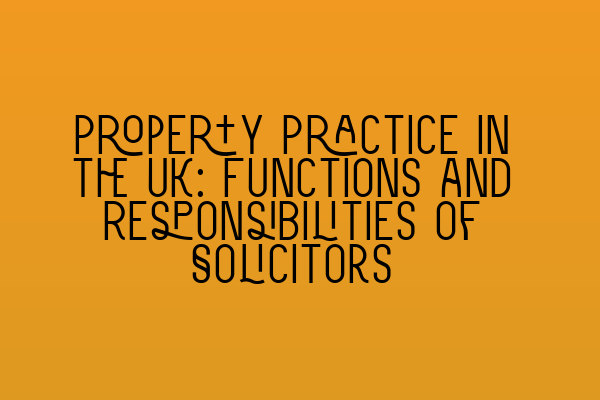Property Practice in the UK: Functions and Responsibilities of Solicitors
Property law is a vital area of legal practice in the UK, encompassing a wide range of matters related to real estate transactions, land ownership, and property rights. Solicitors specializing in property law play a crucial role in assisting individuals and businesses with their property-related legal needs. In this blog post, we will explore the functions and responsibilities of solicitors in property practice, shedding light on their invaluable contributions to the field.
1. Providing Legal Advice and Representation
One of the primary functions of solicitors in property practice is to provide expert legal advice and representation to clients involved in property transactions. Whether it’s buying or selling property, leasing agreements, or property development projects, solicitors have the knowledge and expertise to guide clients through the complex legal framework governing property law in the UK. They ensure that clients are fully aware of their rights, obligations, and potential risks involved in any property transaction.
2. Conveyancing and Title Searches
Conveyancing is a crucial process in property transactions, involving the transfer of legal ownership of a property from one party to another. Solicitors play a pivotal role in undertaking all the necessary steps and documentation required in the conveyancing process. This includes conducting thorough title searches to ensure that the property is free from any encumbrances or legal issues that could affect its marketability and value. Solicitors also handle the drafting and negotiation of contracts, ensuring that the interests of their clients are protected.
3. Drafting and Reviewing Legal Documents
Property transactions often require the preparation and review of various legal documents. Solicitors have the expertise to draft and review contracts, leases, agreements, and other legal documents related to property transactions. Their attention to detail and legal acumen ensures that all necessary clauses, terms, and conditions are included to safeguard their clients’ interests. Solicitors also possess the knowledge of relevant property laws and regulations to ensure the compliance of these documents.
4. Resolving Property Disputes
Property disputes can arise due to various reasons, such as boundary disputes, breach of contracts, adverse possession claims, and landlord-tenant disputes. Solicitors specializing in property law are skilled in resolving these disputes through negotiation, mediation, or, if necessary, litigation. They can provide strategic advice, prepare and present legal arguments, and represent clients in court, aiming to achieve the best possible outcome.
5. Undertaking Due Diligence
Prior to engaging in any property transaction, it is essential to undertake comprehensive due diligence to assess potential risks and liabilities. Solicitors play a crucial role in conducting due diligence, such as assessing the legal status of the property, identifying any planning restrictions or disputes, checking for potential environmental issues, and reviewing relevant documentation. This process helps clients make informed decisions and mitigates risks associated with property transactions.
6. Liaising with Stakeholders
Property transactions involve various stakeholders, including real estate agents, mortgage lenders, surveyors, and local authorities. Solicitors act as intermediaries, effectively communicating and coordinating with these stakeholders on their clients’ behalf. They ensure that all necessary documentation is obtained, relevant information is shared, and deadlines are met, facilitating a smooth and efficient property transaction process.
In conclusion, solicitors specializing in property law play a crucial role in guiding individuals and businesses through the complex legal landscape of property transactions in the UK. Their functions and responsibilities, such as providing legal advice and representation, undertaking conveyancing and due diligence, resolving property disputes, and drafting and reviewing legal documents, are essential in ensuring the smooth and successful completion of property transactions. If you are in need of expert legal assistance in property matters, don’t hesitate to consult a qualified solicitor to navigate the intricacies of property law in the UK.
Related Articles:
– SQE 1 Practice Exam Questions
– SQE 1 Practice Mocks FLK1 FLK2
– SQE 2 Preparation Courses
– SQE 1 Preparation Courses
– SRA SQE Exam Dates
